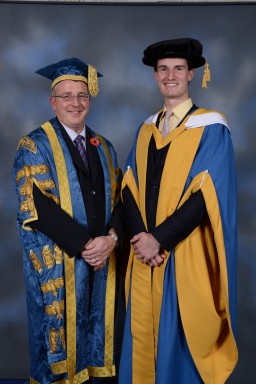A world record holder sports shooter, who won gold at the London 2012 Olympics, has received an Honorary Doctorate from Bournemouth University.
Peter Wilson MBE – who grew up in Sherborne, Dorset – received the accolade during the Business School graduation ceremony.
Peter took a Gold Medal in double trap shooting at the 2012 Olympics, won the World Cup in 2011 and 2012, and holds UK and World records. He was awarded an MBE in the 2013 New Year’s Honours List for services to shooting.
He said he felt “honoured” to receive the Doctor of Arts award from BU.
“I couldn’t quite believe it, I still can’t quite believe it,” he said.
“It’s a bit like the Olympics all over again – your heart’s racing, your blood’s up and you’re just so excited and really honoured.
“It’s great to come back. My roots are here, my family’s here and so I feel very privileged, very humbled.”
Peter added that he works closely with local schools to promote sports, and believes it’s important for students to stay active and healthy while at university.
“Find a sport that you enjoy playing and just take part – whether it be team or individual,” he said.
“I think it’s actually quite healthy – it gets you out of the house and away from study for that small segment of the week, and gives you a bit of a breather.”
He added that his advice to the graduating students was to push themselves and do everything they could to reach their best.
“It’s a tough world out there, so it’s not easy – you’ve got to find something you love, you’ve got to be passionate about it and you’ve got to push yourself to be the best you can be.
“I spoke about that a little bit to all of the graduates and parents about that one motto which drove me through the Olympics – and that is do everything in your power to get the best possible result out of yourself.”
More than 5,000 graduates from across Bournemouth University were handed their degree certificates in six different ceremonies at the Bournemouth International Centre.
Professor John Vinney, Vice-Chancellor of Bournemouth University, said: “Bournemouth University takes great pride in our Honorary Graduates.
“We recognise people who have excelled in their chosen field who will act as inspirational role models, both for our graduates and their families at the awards ceremonies and for our whole student body in the coming years.”
 Bournemouth University
Bournemouth University